If you loved *Deception*, you’ll definitely appreciate these twisty thrillers. *Gone Girl* keeps you guessing with its complex marriage dynamics, while *Shutter Island* plays with memory and reality. In *The Girl on the Train*, an unreliable narrator pulls you into betrayal. *The Game* offers a mind-bending experience, and *Black Swan* explores ambition’s dark side. Don’t miss *Memento* and *The Prestige*, both filled with thrilling surprises. Discover more about these enthralling films ahead!
Key Takeaways
- *Gone Girl* features a dual narrative and dark secrets, challenging perceptions of marriage and media manipulation, keeping viewers engaged and guessing.
- *Shutter Island* employs flashbacks and dream sequences, creating a chilling atmosphere as reality blurs during Teddy’s investigation into mental illness.
- *The Girl On The Train* presents an unreliable narrator, twisting trust and betrayal in relationships, engaging audiences with its emotional depth and unexpected turns.
- *The Game* utilizes non-linear storytelling to blur the lines between reality and illusion, maintaining suspense and provoking thought throughout its mind-bending journey.
- *Memento* explores memory and identity through a non-linear narrative structure, compelling viewers to piece together the protagonist’s fragmented reality and quest for vengeance.
Gone Girl (2014)
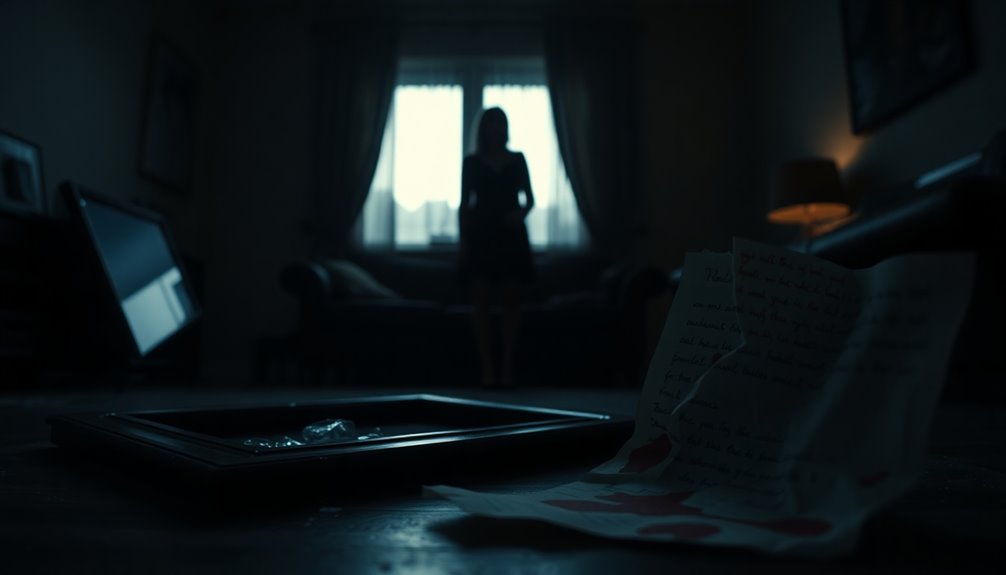
When you plunge into *Gone Girl* (2014), directed by David Fincher, you’re stepping into a gripping psychological thriller that unravels the complexities of marriage and the dark side of media manipulation.
The film follows Nick and Amy Dunne, with Nick portrayed by Ben Affleck and Amy by Rosamund Pike, who captivates with her Oscar-nominated performance. The suspenseful plot twists keep you on edge as Nick becomes the prime suspect in Amy’s mysterious disappearance.
Through a dual narrative, Amy’s diary entries reveal dark secrets that challenge societal norms and gender roles. As you watch, you’ll see why *Gone Girl* became a cultural phenomenon, grossing over $369 million and leaving viewers questioning the truths behind relationships and media portrayals. This exploration of media manipulation further emphasizes the ethical implications of how narratives are shaped in society.
Shutter Island (2010)
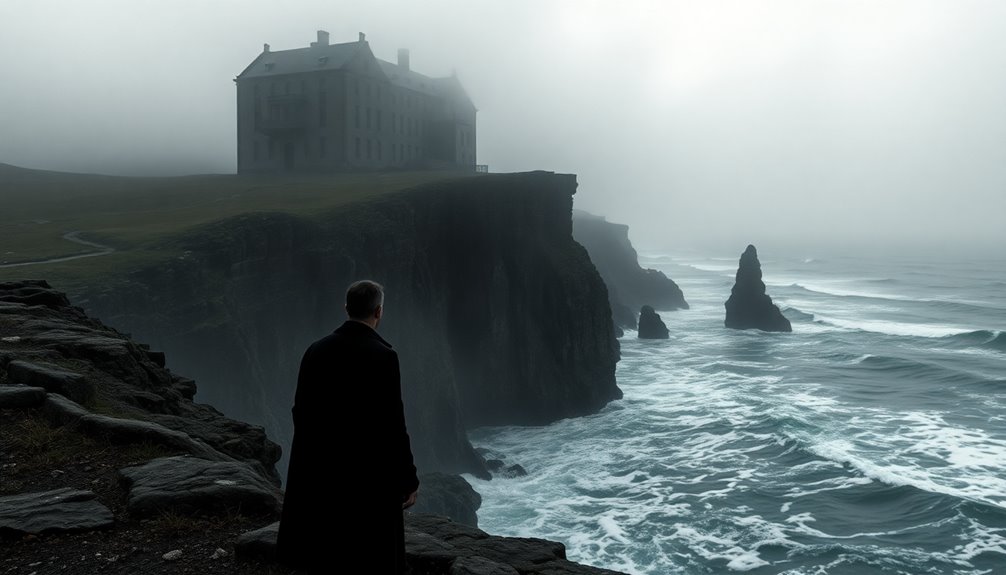
*Shutter Island* (2010) pulls you into a chilling investigation led by U.S. Marshal Teddy Daniels, played by Leonardo DiCaprio. Set in an eerie mental institution, the film explores themes of trauma and mental illness, keeping you on edge throughout.
- Experience an enthralling mystery
- Immerse yourself in an unsettling atmosphere
- Question reality alongside Teddy
As Daniels investigates a patient’s disappearance, the narrative uses flashbacks and dream sequences, intensifying the psychological thriller element.
You’ll find yourself questioning not just the mystery at hand but also Teddy’s sanity. In a similar way, the film’s atmosphere can evoke feelings of improved air quality, essential for maintaining a clear mind while watching such a complex plot.
With its critical acclaim and impressive box office gross, Shutter Island is a must-watch for anyone who loves a gripping, twisty tale that blurs the lines of reality.
The Girl On The Train (2016)

In “The Girl On The Train,” you experience the unsettling dynamics of an unreliable narrator through Rachel’s perspective, making it hard to discern truth from fiction.
As you witness her unraveling life, themes of betrayal surface, revealing the complexities of relationships. The emotional volatility depicted in the film mirrors the challenges faced when dealing with borderline personality disorder in real-life relationships. This tension keeps you on the edge of your seat, wondering who to trust in a world full of deception.
Unreliable Narrator Dynamics
How does an unreliable narrator shape your perception of a story? In The Girl On The Train, Rachel Watson’s struggles with alcoholism create a veil of deception that distorts reality, making her an intriguing unreliable narrator.
- You question her fragmented memories.
- You become entangled in her emotional turmoil.
- You navigate through twists that keep you guessing.
As a psychological thriller, the film’s suspense builds as Rachel’s misinterpretations lead to shocking revelations about obsession and the true nature of those around her.
Flashbacks and shifting perspectives further complicate your understanding, forcing you to grapple with what’s real versus what’s imagined.
Ultimately, Rachel’s unreliable narration drives the plot, enriching the experience and deepening the mystery. This narrative technique mirrors the importance of QA in identifying gaps and enhancing the overall quality of storytelling.
Themes of Betrayal
As you explore *The Girl on the Train*, the theme of betrayal becomes evident through Rachel’s journey, where her own trust issues mirror the treachery she observes in others.
Her emotional turmoil and struggles with alcoholism cloud her perception, revealing the deceptive nature of relationships. Rachel’s obsession with the seemingly perfect couple, Megan and Scott, uncovers dark secrets that challenge societal expectations of fidelity and marriage.
The film intricately weaves unreliable narration, as Rachel’s memories mislead her, heightening the impact of betrayal. Each character embodies layers of deception, complicating their interactions and exposing the fragile nature of trust.
Ultimately, the shocking revelations serve as a stark reminder of how betrayal can distort reality and unravel relationships. This narrative resonates with the concept of unresolved issues that often lead to repeated cycles of emotional turmoil in relationships.
The Game (1997)
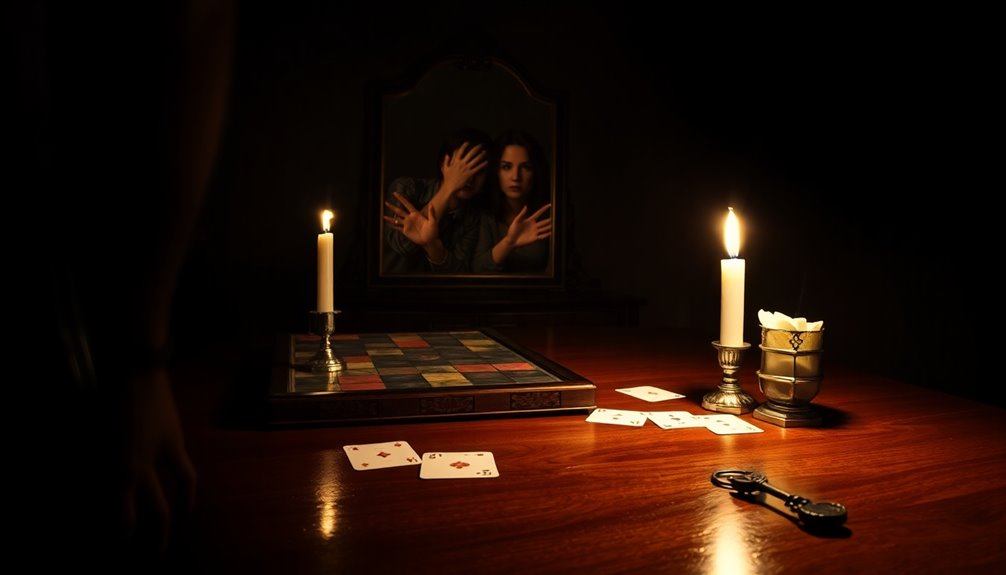
While many thrillers rely on straightforward plots, *The Game* (1997) takes you on a mind-bending journey that blurs the lines between reality and illusion. Directed by David Fincher, this psychological thriller stars Michael Douglas as Nicholas Van Orton, a wealthy banker thrust into a mysterious personalized game that disrupts his life.
- Experience a suspenseful journey filled with unexpected twists.
- Challenge your perception of reality alongside the protagonist.
- Encounter themes of fear and deception that resonate deeply.
With its non-linear storytelling and compelling performances, The Game keeps you guessing until the climactic finale. As Nicholas confronts his own fears and vulnerabilities, you’ll be left pondering the true nature of the game long after the credits roll. This exploration of emotional dysregulation mirrors the experiences of those with Borderline Personality Disorder.
Black Swan (2010)

Diving into the world of *Black Swan* (2010) reveals a haunting exploration of ambition and obsession that grips you from the start.
Natalie Portman delivers a stunning performance as Nina, a ballet dancer consumed by the intense competition for the lead role in “Swan Lake.” This psychological thriller intertwines horror and identity as you watch Nina’s mental deterioration unfold through paranoia and hallucinations.
Natalie Portman’s mesmerizing portrayal of Nina captures the harrowing descent into obsession and madness amidst the fierce ballet competition.
The rivalry with Mila Kunis’s character, Lily, intensifies Nina’s obsession, pushing her deeper into madness. The film’s striking visual symbolism and intense choreography heighten the unsettling atmosphere, making you question what’s real and what’s imagined.
The impact of narcissistic abuse on mental health can resonate deeply with Nina’s character, showcasing how intense pressure and rivalry can lead to psychological distress that manifests in devastating ways.
*Black Swan* is a masterful blend of psychological tension and horror, leaving you breathless and on the edge of your seat.
Memento (2000)
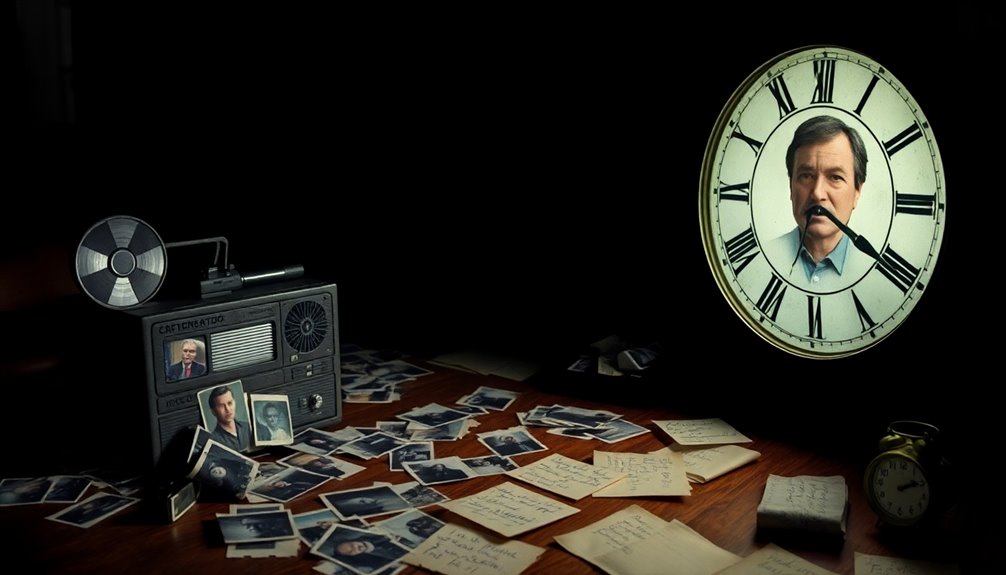
In *Memento*, you’ll find yourself grappling with the complexities of memory and identity as Leonard Shelby navigates his fragmented existence.
The film’s non-linear narrative structure keeps you on your toes, forcing you to piece together the mystery alongside him.
This unique storytelling not only enhances the suspense but also prompts you to question what you really know about yourself and others. Additionally, the film’s exploration of memory and identity reflects deeper psychological themes that resonate with viewers.
Memory and Identity Crisis
As you navigate the intricacies of *Memento*, the film’s exploration of memory and identity crisis becomes strikingly apparent. You witness Leonard Shelby grappling with the trauma of his past, forcing you to question the reliability of your perceptions and sense of self.
- Memory shapes identity.
- Trauma disrupts self-understanding.
- Vengeance complicates clarity.
This psychological thriller employs innovative storytelling to depict Leonard’s fragmented identity, emphasizing how memory loss can distort reality. The film’s themes resonate with the way high-quality protein sources can support overall health, just as Leonard’s quest for clarity supports his identity.
His relentless quest for vengeance reveals the emotional turmoil that accompanies his condition, making you ponder the fragility of memory.
Ultimately, Memento invites you to reflect on how the past defines you, leaving you on the edge of your seat as you piece together his journey amid the chaos of his mind.
Non-linear Narrative Structure
While exploring *Memento*, you’ll quickly notice its non-linear narrative structure that unfolds in reverse chronological order, immersing you in Leonard’s disorienting experience.
This innovative technique by Christopher Nolan creates a unique viewing experience, compelling you to piece together the fragmented story alongside the protagonist.
The film’s complexity deepens as it intersperses black-and-white scenes with color, enhancing your understanding of memory and identity.
As you navigate the plot, the psychological thriller invites you to ponder the nature of truth and how it shapes Leonard’s quest for vengeance.
This approach has garnered critical acclaim, establishing *Memento* as a landmark in the genre, earning Academy Award nominations for Best Original Screenplay and Best Film Editing.
In addition, the film exemplifies the power of content clustering as it connects various themes and motifs, encouraging viewers to engage with the narrative on multiple levels.
The Prestige (2006)
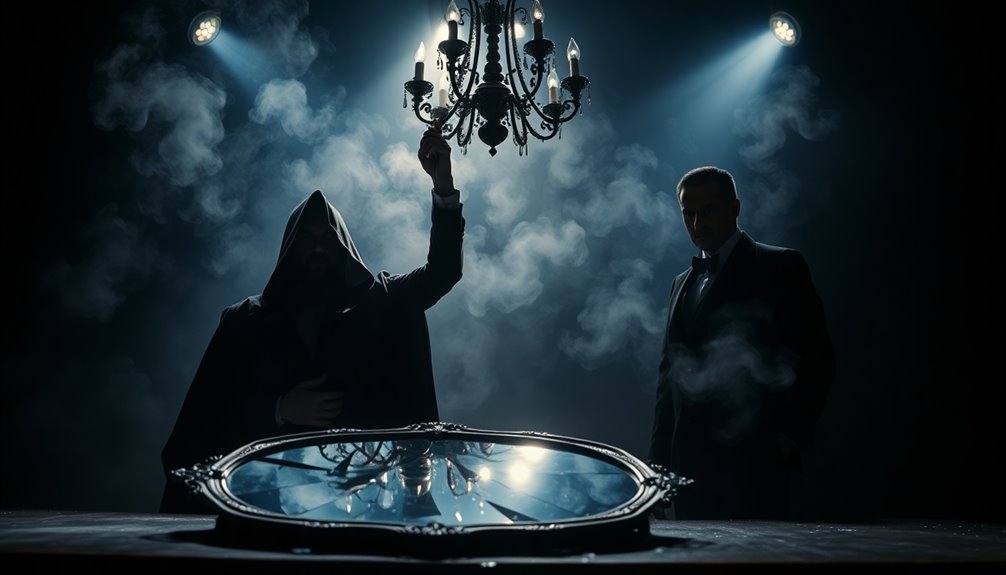
Delving into the world of magic and rivalry, The Prestige (2006) captivates audiences with its intricate plot and compelling performances. Directed by Christopher Nolan, this psychological thriller explores the depths of obsession and ambition between two rival magicians in Victorian London.
- Experience the fine line between illusion and reality.
- Discover the shocking plot twists that keep you guessing.
- Engage with its brilliant non-linear storytelling.
As the magicians sacrifice everything to outdo each other, you’ll witness a masterclass in tension and intrigue.
With an IMDb rating of 8.5, The Prestige has earned its place in the domain of twisty thrillers, leaving viewers questioning what’s real until the very end.
Prepare for a cinematic experience that’s unforgettable!
Frequently Asked Questions
Which Is the No. 1 Suspense Movie?
When you think about the top suspense movie, “The Silence of the Lambs” often comes to mind.
It’s a masterclass in psychological thrillers, blending horror and intellect through the chilling interactions between Clarice Starling and Dr. Hannibal Lecter.
You’ll find yourself captivated by the intricate plot and the deep exploration of fear and manipulation.
With its five Academy Awards, it’s no wonder this film remains a cultural touchstone in the genre.
What Is the Best Psychological Thriller You’ve Ever Seen?
Did you know that over 50% of viewers prefer psychological thrillers for their complexity?
For me, *Gone Girl* stands out as the best psychological thriller. It brilliantly captures the dark sides of marriage and media, keeping you on the edge of your seat with its unexpected twists.
The character developments and chilling narrative make you question everything you thought you knew. If you haven’t seen it yet, you’re in for a real treat!
What Are the Most Unpredictable Movies?
When you think of the most unpredictable movies, titles like “Gone Girl” and “Fight Club” come to mind. These films twist your expectations, leading you down unexpected paths.
“The Usual Suspects” keeps you guessing with its clever storytelling, while “Memento” draws you into a fragmented narrative that mirrors confusion.
Don’t forget “Prisoners,” which challenges your moral compass through shocking developments.
Each of these films guarantees a gripping, mind-bending experience that’ll leave you questioning everything.
What Is the Best Mystery Thriller of All Time?
When you think about the best mystery thriller of all time, “Se7en” often comes to mind. Its chilling exploration of a serial killer’s motives and the dark themes of morality grip you from the start.
The film’s atmosphere, combined with intense performances, makes it unforgettable. You’ll find yourself on the edge of your seat, piecing together clues alongside the detectives.
It’s a masterclass in suspense that keeps you guessing until the very end.
Conclusion
Just like a clever magician, these twisty thrillers pull you into their enchanting illusions, making you question reality at every turn. Each film is a puzzle waiting to be solved, leading you down unexpected paths filled with suspense and intrigue. So, grab your popcorn and prepare for a rollercoaster of emotions—these films will keep you on the edge of your seat, guessing until the final moment. Immerse yourself, and let the mind games begin!









